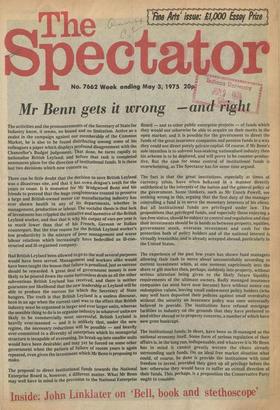Mr Benn gets it wrong and right
The activities and the pronouncements of the Secretary of State for Industry know, it seems, no bound and no limitation. Active as a zealot in the campaign against our membership of the Common Market, he is also to be found distributing among some of his colleagues a paper which displays profound disagreement with the Chancellor's Budget judgement. That done, he turns rapidly to nationalise British Leyland; and before that task is completed announces plans for the direction of institutional funds. It is these last two decisions which now concern us.
There can be little doubt that the decision to save British Leyland was a disastrous one, and that it has sown dragon's teeth for the years to come. It is nonsense for Mr Wedgwood Benn and his friends to pretend that the huge conglomerate created to preserve a large and British-owned motor car manufacturing industry has ever shown health in any of its departments, whether in management, production or labour. The socialist thesis is that lack of investment has crippled the initiative and incentive of the British Leyland worker, and that that is why his output of cars per year is so much lower than that of his French, German or Italian counterpart. But the true reason for the British Leyland worker's low productivity is the mixture of poor management and worse labour relations which increasingly have bedevilled an ill-constructed and ill-organised company.
Had British Leyland been allowed to go to the wall several purposes would have been served. Management and workers alike would have been taught the lesson that failure is penalised, just as success should be rewarded. A great deal of government money is now likely to be poured down the same bottomless drain as all the other subventions British Leyland has received, and there is neither guarantee nor likelihood that the new leadership at Leyland will be able to produce the success for which the Secretary of State hungers. The truth is that British Leyland is a useless dinosaur, born in an age when the current cant was to the effect that British industry must be organised in larger and ever larger units, whereas the sensible thing to do is to organise industry in whatever unitsare likely to be commercially most successful. British Leyland is heavily over-manned — and it is unlikely that, under the new regime, the necessary reductions will be possible — and heavily over-committed to a diversity of enterprises which its managerial structure is incapable of overseeing. Its break-up into smaller units would have been desirable; and may yet be forced on some other government when the pattern of failure of recent years is again repeated, even given the investment which Mr Benn is proposing to make.
The proposal to direct institutional funds towards the National Enterprise Board is, however, a different matter. What Mr Benn may well have in mind is the provision to the National Enterprise Board — and to other public enterprise projects — of funds which they would not otherwise be able to acquire on their merits in the open market; and it is possible for the government to direct the funds of the great insurance companies and pension funds in a way they could not direct purely private capital. Of course, if Mr Senn's sole intention is to subvent loss-making nationalised industry then his scheme is to be deplored, and will prove to be counter-productive. But the case for some control of institutional funds is overwhelming, as The Spectator has for some time argued.
The fact is that the great institutions, especially at times of currency crisis, have often behaved in a manner directly antithetical to the interests of the nation and the general policy of the government. Some thinkers, such as Mr Enoch Powell, see nothing wrong in this, arguing that the first duty of the manager controlling a fund is to serve the monetary interests of his client. But all institutional funds are privileged under law. The propositions that privileged funds, and especially those enjoying a tax-free status, should be subject to control and regulation and that their investments should be in bands as between property, equities, government stock, overseas investment and cash for the protection both of policy holders and of the national interest is virtually irresistible, and is already accepted abroad, particularly in the United States.
The experience of the past few years has shown fund managers allowing their cash to move about uncontrollably according to current investment whim, at one moment capriciously into the share or gilt market then, perhaps, suddenly into property, without serious attention being given to the likely future liquidity requirements of the ultimate owners. Badly managed insurance companies (as most have now become) have without notice cut redemption values, leaving small endowment policy holders (who may well have deposited their policies against small overdrafts) without the security an insurance policy was once universally believed to provide. The institutions have refused mortgage facilities to industry on the grounds that they have preferred to lend either abroad or to property concerns, a number of which have now gone bankrupt.
The institutional funds, in short, have been as ill-managed as the national economy itself. Some form of serious regulation of their affairs is, in the long run, indispensable, and whatever it is Mr Benn has in mind it cannot greatly worsen the chaos already surrounding such funds. On an ideal free market situation what could, of course, be done is provide the institutions with total freedom to invest, provided they gave up all privilege before the law: otherwise they would have to suffer an overall direction of their funds. This, perhaps, is a proposition the Conservative Party ought to consider.


































